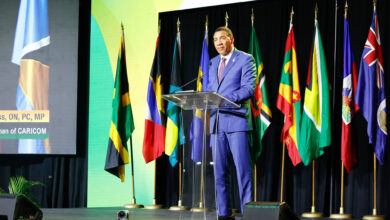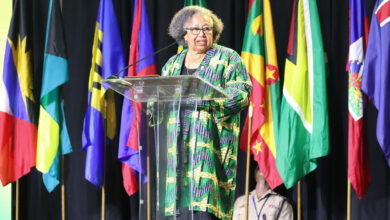CARIBBEAN CONCERNED OVER EC SUGAR REFORM PROPOSALS Steep Price Cuts to have Devastating Effect on Region’s Fragile Economies CHRIST CHURCH, BARBADOS – The European Commission unveiled plans Wednesday (June 22) for an overhaul of the Common Market Organisation for sugar. The Commission reform proposals cut guaranteed prices, totalling 39 percent in the price of white sugar over a period of four years. When fully in effect, the 39 percent cut will cost Africa Caribbean and Pacific (ACP) sugar-producing countries an estimated €400 million per annum, while losses to Caribbean countries alone would amount to over €100 million per annum, according to Caribbean sugar industry insiders. A modest €40 million in assistance for 2006 has been earmarked for the eighteen sugar-producing ACP countries, and is expected to pave the way for accompanying measures which the European Union (EU) maintains would assist ACP sugar-producing countries in the period of transition when reform proposals are coming into effect. A regional sugar industry insider noted, “the Commission has been careful in its proposals to make substantial and specific provision for compensating European beet farmers affected by the proposals, but no such provision has been made in their proposals for ACP producers.” Along with other Members of the ACP Group, the Caribbean reacted forcefully to the sweeping reforms planned, warning that there will be a devastating impact for the small, vulnerable developing economies of the Region, if implemented. In addition to sustaining many of the Region’s economies, preferential access to European markets safeguards the livelihoods of tens of thousands of families in the Caribbean. The sugar industry has a multifunctional role in the Caribbean, especially in traditionally more impoverished rural areas. The severe challenge to the Region’s sugar industry, implicit in the Commission’s proposals, could deleteriously impact countless thousands of farmers, their families and ancillary businesses dependent on the industry. Director General of the Caribbean Regional Negotiating Machinery (RNM) Ambassador Dr. Richard Bernal reacted with dismay to the Commission’s proposals. “The proposals involve drastic cuts in price, with serious implications for this Region’s sugar industry; indeed the industry is facing a direful threat,” he said. Ambassador Bernal noted that St. Kitts & Nevis has been forced to exit from sugar production for export, impetus for which has come from the Commission’s more recent actions as regards sugar. Dr. Bernal cautioned, though, that yesterday’s announcement is just that – a proposal; and that it still faces an EU process, before it can be agreed to. The RNM head emphasized that the proposals have to be vetted by way of the EU Agriculture Council, the EU Council of Ministers, the EU Parliament and EU Member States (some of which oppose the indicative cuts). Allied to this process, the proposals will go through intense review in the ACP Group. In the Caribbean, the first high-level opportunity to consider them will be on the occasion of the Twenty-Sixth Regular Meeting of the Conference of Heads of Government of CARICOM scheduled for July 3 to 6, where sugar will feature prominently on the meeting’s agenda. Responses to the Commission’s announcement yesterday have already been forthcoming from Caribbean Heads of Government. In a statement released by the Office of the President-Guyana, it was noted: “The price cuts being proposed are extreme, and the timeframe too short for any success in the implementation of a reasonable assistance scheme. We anticipate that better sense will prevail and a fairer judgment exercised when the reform proposal comes up for consideration at the level of the Agriculture Council.” In a June 17 letter to United Kingdom Prime Minister Tony Blair (whose country will be taking over the Chair of the EU July 1), Guyanese President Bharrat Jagdeo requested his intervention to ensure “the sugar price is not cut so drastically, and that any reduction is implemented over a transitional period so that we can adapt to reform in a manageable way.” President Jagdeo acknowledged that CARICOM recognizes the need for changes in the EU sugar regime and that sugar industries in the Region are actively engaged in pursuing strategies of adaptation including alternative uses for cane, but that “our plans cannot be implemented properly under the gun of the proposals now on the table.” He stated that the cut in price “must be less drastic”, begin only in 2008, and implemented gradually, over a period of eight years, to allow time for industries to restructure and modernize. Minister of Foreign Affairs and Foreign Trade of Jamaica Hon. K.D. Knight has stressed that “in order for the Commission’s accompanying measures to have any positive effect, it is absolutely essential that funding is made available up front in 2005.” He added, “any delay will make it impossible for our industries to adapt in time to absorb the impact of price cuts.” In his letter to Prime Minister Blair, President Jagdeo also noted: “We are concerned that the recent WTO Appellate Body decision upholding the ruling of the WTO Panel in the sugar case brought by Brazil, Australia and Thailand against the EU is being used by the European Commission to justify its proposals for reforming the sugar regime. However, these rulings in no way justify the depth and rapidity of the proposed cuts in price.” These sentiments were expressed in light of the recent WTO Panel ruling which was subsequently augmented by the Appellate Body urging the EU to respect its international commitments to developing countries. (An appeal in the dispute over EU subsidies for sugar production pitting Brussels against Australia, Brazil and Thailand was rejected by the WTO Appellate Body in April – see www.crnm.org for RNM UPDATE 0507, May 6, 2005, CARIBBEAN REACTS TO WTO RULING ON EU SUGAR REGIME). ACP countries have traditionally supplied sugar to the EU under the provisions and guarantees of the ACP-EU Sugar Protocol – a legally binding intergovernmental agreement with obligations to be met by all contracting parties. ACP producers are guided by the understanding that the EU will meet their legitimate expectations under the Protocol and the Cotonou Partnership Agreement. Guyana’s Minister of Foreign Trade and CARICOM Ministerial Spokesperson on Sugar Hon. Clement Rohee, who this week attended the 81st session of the ACP Council of Ministers at which Ministerial consultations on sugar took place, June 20, said “it is impossible to overstate the devastating impact the price cuts and timescale proposed by the Commission will have on ACP countries. As far as the ACP is concerned, the proposed reform is too fast, too deep, and too soon.” He concluded: “Under these conditions the sugar industries in many countries will be simply unable to survive, while in other producing countries the so-called reform will inevitably lead to severe cutbacks with disastrous socio-economic consequences.” Industry groups and non-governmental organizations reacted angrily to yesterday’s Commission announcement, denouncing it as antithetical to rich nation’s undertaking to advance a “development-centered” WTO Doha Round and to their commitment to the United Nations Millennium Development Goals. A key Caribbean sugar industry spokesman slammed the Commission, condemning the proposals, saying: “Yesterday’s announcement runs counter to pledges we hear time and again by rich nations regarding their commitment to advancing development-friendly trade practices. It is precisely this disconnect between rhetoric and action that has resulted in the bottlenecks in on-going global trade talks, and led many to question whether the Doha Round can truly deliver on its promise as a ‘development’ round.” Chief Executive Officer of the Sugar Association of the Caribbean Dr. Ian McDonald reacted to the proposals by pledging that the Caribbean sugar industry “would fight tooth and nail against them.” British sugar and sweeteners group Tate & Lyle – Europe’s biggest sugar-cane refiner – described the current proposals as penalizing sugar-cane refiners and as being “seriously inequitable, and [we] will be seeking a fairer and more satisfactory outcome in the next few months.” (Tate & Lyle refines the majority of raw sugar bound for the EU from the 18 sugar-producing ACP countries)
News Letter
Subscribe to our mailing list to get the new updates!
Related

Keynote Address | Dr the Most Honourable Andrew Holness, ON, PC, MP | Prime Minister of Jamaica | Chairman of CARICOM | 49th Regular Meeting of the Conference of CARICOM Heads of Government| 6 July 2025
July 8, 2025
Check Also
Close



